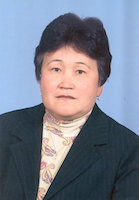Buddhism-related Tuvan personal names
DOI:
https://doi.org/10.25178/nit.2021.2.4Keywords:
Tuvan language; onomastics; name list; personal name; Buddhism; lexical-semantic group; anthroponym; borrowed name; Tuvans; Tuva; Mongolia; Mongolian TuvansAbstract
The article aims to systematize contemporary Tuvan anthroponyms which are linked to Buddhism and were originally borrowed from Tibetan and Sanskrit via Mongolian language. The material presented here was collected by the author in the course of her comprehensive expeditions to Khovd, Bayan-Ölgii, and Khövsgöl aimags of Mongolia and some rayons of the Republic of Tuva.
As a result of our study, eight type of personal names have been identified: 1) anthroponyms stemming from the titles of the holy books and fragments of the sutras read during prayers in Buddhist monasteries; 2) personal names linked to the names of Buddhist deities; 3) those stemming from the names of the planets; 4) those repre-senting the personality and state of those they denote; 5) personal names stemming from words for accessories used by the clergy; 6) names linked to words for vegeta-tion; 7) anthroponyms formed from the roots meaning jewels, metals, etc.; and 8) personal names reflecting virtues of Buddhist worship. For each type, examples are provided in the article.
Also traced are the phonetical transformations which are manifest in almost any borrowed word.
References
Bicheldei, K. A. (1993) Tyva dyl bolgash chugaa kul'turazy [Tuvan language and culture of speech]. Kyzyl, Tuvan Book Publishing House. 103 p. (In Tuv.).
Bol'shoi akademicheskii mongol'sko-russkii slovar' [The Large Academic Mongolian-Russian Dictionary] (2001a): in 4 vols. / executive editor G. Ts. Piurbeev. Moscow, Academia. Vol. 1. 520 р. (In Russ.)
Bol'shoi akademicheskii mongol'sko-russkii slovar' [The Large Academic Mongolian-Russian Dictionary] (2001b): in 4 vols. / executive editor G. Ts. Piurbeev. Moscow, Academia. Vol. 2. 536 р. (In Russ.)
Weinstein, S. I. (1969) Lichnye imena, terminy rodstva i prozvishcha u tuvintsev [Personal names, kinship terms and nicknames among Tuvans]. In: Onomastika [Onomastics] / ed. by V. A. Nikonov and A. V. Superanskaia. Moscow, Nauka. 261 p. Pp. 125–132. (In Russ.).
Vainshtein, S. I. (1979) Sistemy lichnykh imen u narodov mira [Systems of personal names among the peoples of the world]. In: Spravochnik lichnykh imen narodov RSFSR [Handbook of personal names of the peoples of the Russian Soviet Federative Socialist Republic] / ed. by A. V. Superanskaya. Moscow, Russkii iazyk. 656 p. Pp. 197–210. (In Russ.).
Katanov, N. F. (1903) Opyt izsledovaniia uriankhaiskago iazyka, s ukazaniem glavneishikh rodstvennykh otnoshenii ego k drugim iazykam tiurkskago kornia [An essay on the Uryanghai language, indicating the most important kinship ties between it and the other languages of the Turkic root]. St. Petersburg, Tipo-litografiia Imperatorskogo universiteta. 1600 p. (In Russ.).
Lingvisticheskii entsiklopedicheskii slovar' [A linguistic encyclopedia] (1990) / ed. by V. N. Iartsev. Moscow, Sovetskaia entsiklopediia. 683 p. (In Russ.).
Ludup, R. D. (1996a) Adyng-sholang chazhyttary [Secrets of your name]. Bashky, no. 5, pp. 88–90. (In Tuv.).
Published
How to Cite
2021, № 2. С. 44-51. DOI: https://www.doi.org/10.25178/nit.2021.2.4
For citation:
Suvandii N. D. Antroponimy tuvinskogo iazyka, sviazannye s buddiiskoi religiei [Buddhism-related Tuvan personal
names]. New Research of Tuva, 2021, no. 2, pp. 44-51. (In Russ.). DOI: https://www.doi.org/10.25178/nit.2021.2.4
Issue
Section

This work is licensed under a Creative Commons Attribution-NonCommercial 4.0 International License.

Author(s) license holder(s) grant rights for their work to the journal (grantee of a license) under the simple non-exclusive open license in accordance with Art. 1286.1 «Open license for a research work, work of literature or fine arts», Civil Code of the Russian Federation.
New Research of Tuva publishes articles under the Creative Commons Attribution-NonCommercial license (CC BY-NC).
Since it is an open license, author(s) reserve the right to upload the article to their institutional repository, submit it to another journal (if it allows republications), or republish it on their own website (in full, or in part).
However, several conditions apply here:
a) The republished version must always contain the name(s) and affiliation(s) of the author(s), the original title and the hyperlink to the original version on the New Research of Tuva website;
b) It must be in open access, free of charge, and no category of readers must be in any way whatsoever advantaged over general readership.
c) should the contribution be submitted elsewhere by its author(s) without substantial modification (30% or more of original text unchanged), the body of the article should contain a disclaimer that the original version was published in New Research of Tuva (with a link to the respective page)
The CC-BY-NC is a non-revocable license which applies worldwide and lasts for the duration of the work’s copyright.









